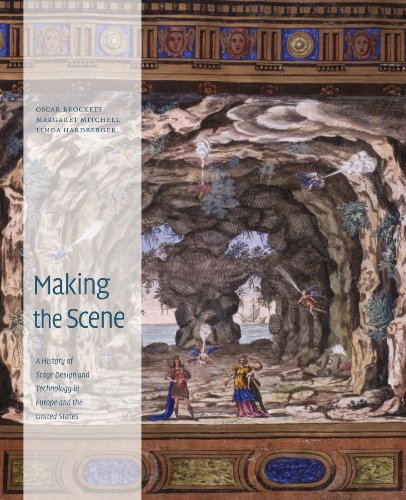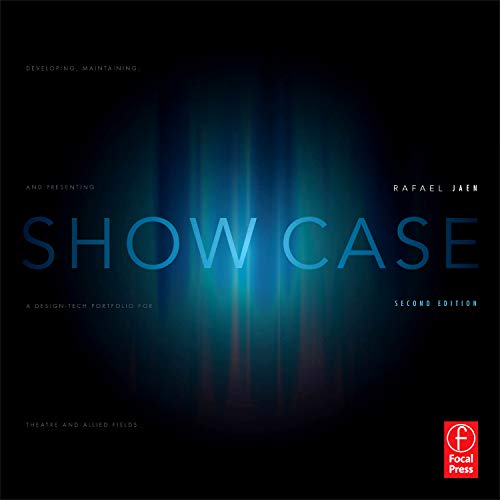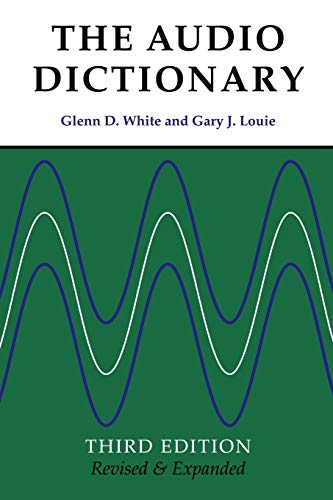(Part 2) Top products from r/techtheatre
We found 38 product mentions on r/techtheatre. We ranked the 409 resulting products by number of redditors who mentioned them. Here are the products ranked 21-40. You can also go back to the previous section.
21. COAST PX20 Dual Color 315 Lumen LED Flashlight
Sentiment score: 1
Number of reviews: 2
DUAL COLOR: White and Red beams all in one. Red light preserves night vision. Great for versatile work during the night and day.BULLS-EYE SPOT BEAM OPTIC: Consists of an extremely bright, centered ‘hot spot’ and a very consistent transition halo to increase the effective viewing area.SPECS: 315 ...
 Show Reddit reviews
Show Reddit reviews22. The Light Source Mega Combo Wrench (Blue)
Sentiment score: 1
Number of reviews: 2
Dimensions: 2-3/4" Long x 1" Wide x 3/4" ThickWeight: 1.4 oz
 Show Reddit reviews
Show Reddit reviews23. Vectorworks for Entertainment Design: Using Vectorworks to Design and Document Scenery, Lighting, and Sound
Sentiment score: 1
Number of reviews: 2
Focal Press
 Show Reddit reviews
Show Reddit reviews24. Making the Scene: A History of Stage Design and Technology in Europe and the United States
Sentiment score: 2
Number of reviews: 2
 Show Reddit reviews
Show Reddit reviews26. Ultimate Flat Focus Tool Black
Sentiment score: 1
Number of reviews: 2
Made in the USA
 Show Reddit reviews
Show Reddit reviews27. Designing with Light: An Introduction to Stage Lighting
Sentiment score: 1
Number of reviews: 2
 Show Reddit reviews
Show Reddit reviews28. The Stage Management Handbook
Sentiment score: 1
Number of reviews: 2
Used Book in Good Condition
 Show Reddit reviews
Show Reddit reviews30. Leviton D4DMX-MD5 4-Channel Programmable Dimmer Pack Integrating Stand-Alone, 3-Pin DMX 15A Power Cord
Sentiment score: 1
Number of reviews: 2
Bright LED display for easy, menu-driven programmingVersatile output channel selector lets you choose the exact number of channels you needClear operation instructions printed on back of unit for ease of useAvailable with DMX on 3-pin (D4DMX-MD3) or 5-pin (D4DMX-MD5) XLR receptaclesData "in" and "ou...
 Show Reddit reviews
Show Reddit reviews31. Sound Systems: Design and Optimization, Second Edition: Modern Techniques and Tools for Sound System Design and Alignment
Sentiment score: 1
Number of reviews: 2
 Show Reddit reviews
Show Reddit reviews32. Show Case: Developing, Maintaining, and Presenting a Design-Tech Portfolio for Theatre and Allied Fields
Sentiment score: 2
Number of reviews: 2
Focal Press
 Show Reddit reviews
Show Reddit reviews33. Eliminator Lighting SPECIAL EFFECTS LIGHTING AND EQUIPMENT, one size (ED-15)
Sentiment score: 1
Number of reviews: 2
4-CHANNEL DMX DIMMER PACK: There are 4 dual Edison sockets for channel output. Up to 5amps may connect to each channel.PLUG AND PLAY: Eliminators ED15 4-Channel Dimmer Pack is fully controllable with a Dmx control. Working position includes any safe position.STAGE LIGHTING: The ED15 works wonderfull...
 Show Reddit reviews
Show Reddit reviews34. The Dramatic Imagination: Reflections and Speculations on the Art of the Theatre, Reissue (Theatre Arts Book)
Sentiment score: 1
Number of reviews: 2
Routledge
 Show Reddit reviews
Show Reddit reviews35. The Automated Lighting Programmer's Handbook
Sentiment score: 1
Number of reviews: 2
Focal Press
 Show Reddit reviews
Show Reddit reviews36. Stage Manager: The Professional Experience
Sentiment score: 0
Number of reviews: 1
 Show Reddit reviews
Show Reddit reviews38. The Lighting Art: The Aesthetics of Stage Lighting Design (2nd Edition)
Sentiment score: 1
Number of reviews: 1
 Show Reddit reviews
Show Reddit reviews




Hey friend! Before I start, let me just say I know where you're coming from. When I SM'd in High School, it was very different from what an SM would do on a Regional or Broadway caliber show. The important thing is to realize that that is ok. Community and High School theatre SMs must have a 'the show must go on' mentality, and do a lot of what you described, that is, running the deck, supervising tech. I did a lot of this in High School when I would SM, and it's very different from the real world. However, I now go to college in NYC in an incredible SM program, where I study under Broadway SMs and have shadowed Broadway shows. And you can too, but you need to know how to use your High School's theatre to your advantage.
A huge thing to realize here is that while it seems like a good idea to try to run your SM program like a Broadway show, or like how the text books say, it isn't. High School theatre is its own type of production. Just like Regional Theatre is extremely different from Broadway, HS theatre is different as well. The appropriate way to SM Broadway isn't exactly the same on a LORT show, and furthermore, not the same as HS theatre. What this means is, you need to calmly figure out exactly what functions a Stage Manager needs to fulfill to best serve your HS productions, not if your HS was Broadway.
Ask yourself if going against the grain and uprooting an old system is necessary. It seems that what you have going on is similar to most High Schools, and those systems are usually built out of necessity, or rather, what the HS needs out of an SM. So would you be bettering you HS by making the SM program more like what a Broadway show would be like, or would it impede the production running smoothly. Also, would you be paving the way for future SMs in your school, or just shaping what you want from your school. There isn't a right answer, and it can't and shouldn't fall completely on you to fix everything.
When I was in HS, I knew that I needed to work on skills that I wasn't using in HS, but would need in college. Instead of changing the entire production, I pretended. So while I never really needed a full contact sheet, rehearsal and performance reports, or scene tracking, or properly formatted schedules, I would make this paperwork anyway, and keep it for myself. I made full show bibles, even though I didn't need to, and just kept them for my portfolio. I never called a full show in high school, and I can call a pretty tight show nowadays. Calling is an important skill, but keep in mind that it's only like, 1/10th of what we do as SMs.
The skills you are acquiring while working with the crew and construction will be invaluable to you later on as you do less of that kind of work, but still need to know about it. When it comes time for college, you need to understand the difference between 'real world' stage management and what you do now, and figure out if it's still the job you want (I guarantee, it is very different from what you'll be used to). Also, keep in mind, no one expects you to be able to Stage Manage an Off-Broadway show by now. Keep in mind that you're here to learn just as much as anyone else, and you're allowed to make mistakes.
I hope that covered everything. I would be happy to answer other questions you may have. Best of Luck, and Break Legs!
Edit: formatting
Scene Design and Stage Lighting is an often-used text-book from what I can tell. I have an old version myself, but can't attest to the current version. Design and Drawing for the Theatre is also an old standby (and denser), though it appears it's out of print.
If you want something lighter and less expensive, perhaps Fundamentals of Theatrical Design or An Introduction to Theatre Design, though they aren't limited to just scenery. I haven't read the former, but the I've taught from the latter in an intro to design course. It's rather light, but that can be good for a first book.
You can also go the more theoretical route, and pick up the classic Dramatic Imagination by Robert Edmund Jones. What is Scenography? and Scenographic Imagination are chock-full of great theoretical discussion for the long term, but not suited for your first dip into the pool. Might be worth bookmarking for down the road, though.
And sometimes it's good to just have a survey of other's work. American Set Design isn't a bad place to start for that. I recently picked up World Scenography, and while I haven't had the chance to sit down extensively with it, it's a gorgeous book.
This is of course just going from scene design, there's also options out there about the history of design, useful technical handbooks for the craft, or even more specific things like model-making.
If you're already generally familiar with theater and roughly understand the production process, maybe grab one of the two in the first paragraph. If you're coming in completely fresh, starting with one of the cheaper super-introductory books in the second paragraph might be better to ease in. If you have the funds, I'd suggest one from each paragraph. Perhaps others in this sub have more specific choices they feel are definitively superior than other options.
Also, I'm guessing your university may not have a design professor, but you might suggest an independent study in scene design as a course. Hope this helps!
If you are looking to do sound I would definitely pick up a copy of Yamaha's Sound Reinforcement Handbook. It is a super helpful book for giving you a basic knowledge of systems, how they work and how to make them work for you. It is somewhat out of date but is still super useful. The Audio Dictionary is also a very helpful resource.
Also make sure to get a very good knowledge of power and electrical theory. I'm always amazed at how lost a lot of audio engineers/sound designers seem to be when it comes to power. It is an extremely important part of what we have to do.
For engineering concepts, and a great general reference on sound systems and how they work, the Yamaha Sound Reinforcement Handbook
For sound system design, the best reference is Bob McCarthy's Sound Systems: Design and Optimization
For another great book that discusses both system design as well as artistic sound design, John Leondard's Theatre Sound is top notch.
Shannon Slaton's Mixing a Musical: Broadway Theatrical Sound Techniques is a great picture of how the "big shows" are run.
For a beginner's guide to sound, the [http://www.soundcraft.com/support/gtm_booklet.aspx](Soundcraft Guide to Mixing) is a good primer: not as technically dense as the Yamaha book.
There are others out there, these are my favorite.
Designing with Light is a great introduction to design, the price is criminal https://www.amazon.com/Designing-Light-Introduction-Stage-Lighting/dp/0073514233/ref=dp_ob_title_bk
A Practical guide to Stage Lighting is one of the best and most complete books on the subject https://www.amazon.com/Practical-Guide-Stage-Lighting-Third/dp/0415812003/ref=pd_sim_14_4?ie=UTF8&dpID=51wHNTlRvuL&dpSrc=sims&preST=_AC_UL160_SR124%2C160_&refRID=F1TC2GN49HDAM9GJ75ZZ
The Design Idea is a great book on design https://www.amazon.com/Lighting-Design-Idea-Wadsworth-Theatre/dp/1111836868/ref=sr_1_1?s=books&ie=UTF8&qid=1465919421&sr=1-1&keywords=linda+essig
Stage Lighting Design: The Art, Craft and Life is another great book https://www.amazon.com/Stage-Lighting-Design-Craft-Life/dp/0896762351/ref=sr_1_1?s=books&ie=UTF8&qid=1465919500&sr=1-1&keywords=richard+pilbrow
There are my top 4 lets see what others suggest.
http://www.amazon.com/Show-Case-Second-Edition-Maintaining/dp/0240819268/ref=pd_sim_b_1/176-7324097-3879356
This is a pretty awesome book and it pretty much covers all the standards on how to present your design work in portfolio form its quite good.
I like the Coast PX20 when working backstage. Not too bright and the red option is a great feature. I hate lights that make you cycle through different brightness levels so the single option is great for me. Battery life is also great.
This is a great resource for portfolios:
https://www.amazon.com/Show-Case-Developing-Maintaining-Design-Tech/dp/0240819268/ref=sr_1_1?ie=UTF8&qid=1478057461&sr=8-1&keywords=rafael+jaen
Some key things:
If you're coming in person, don't be afraid to bring a physical item. When I had my final portfolio review in college, the strongest feedback I received was in regards to the fact that when I showed images of props I'd built for "Grease", I also pulled a fake root-beer float out of my bag and put in on the table.
-Don't be afraid to go back and enhance your past work. If you designed a show in high school but didn't do a scenic design sketch at the time, go back and do one and include it. If you know how to do a scale drawing, make a simple scale plan for a scenic element that you built for a show.
I quite enjoy Making the Scene. It's just a general history of the craft, but it's a gorgeous book and exceedingly well thought out.
Read these books. They won't make you a rigger but you'll have a better appreciation of what you are dealing with.
The Arena Riggers' Handbook
Rigging Math Made Simple
Stage Rigging Handbook
Entertainment Rigging for the 21st Century
The Theatre Riggers' Handbook
Structural Design for the Stage
The Physics of Theatre: Mechanics
I just got home from school and I just want to say thank you to everyone who responded today. You have shed light (poor joke) on my current lighting system making it clear what will and what won't work with my current set up(ds3000II). I just purchased
3 x https://www.amazon.com/Eliminator-Lighting-ED-15-Special-Equipment/dp/B000WKY4C8 thanks for suggestion donnodoes and hoping to get a new control board to run the dimmer packs.
I just got the flat focus tool. It's fantastic for stage lights and definitely worth it for the low price.
Ultimate Flat Focus Tool Black https://www.amazon.com/dp/B004HPZZSG/ref=cm_sw_r_awd_k7cXub10SSE03
Thanks for your replies. I thought about using these dimmer packs and just use 6 of them as 15 A is plenty for old lights. What are your thoughts? The protocol box is fine but I really can't find a good cheap one. The cheapest I found was around 750 dollars. And for 150 dollars more I'm sure the board won't mind getting brand new dimmers.
I'd much rather have the Ultimate Flat Focus Tool with me than the Altman wrench. I usually carry one at work because it's smaller than all the others and it's handy to slip into a back pocket. It wouldn't necessarily be my first choice for a long hang and focus, but I'd definitely take it over the Altman.
Here is a good ranking of all they types of wrenches out there
I have owned one in the 10+ years of doing live shows and events, and I still use my basic c-wrench. I find that it is too long, so it does not sit in my chalk bag/back pocket all that well. And is only good if the show I am loading in is all conventional with standard C-clamps.
I do too many shows that use mega clamps, or cheeseboros on their instruments/pipes. So instead of me having to carry a c-wrench in addition to the lighting wrench, I just skip the lighting wrench.
I do carry the small combo wrench for focus. And that does the job nicely.
Another note. The light speed wrench tends to cause FNG's to wrench to hard down on a c-clamp. Causing them to dig in and damage aluminum truss cords.
As a sort of general book, I highly recommend "The Dramatic Imagination" by Robert Edmond Jones
Pick up this book, maybe it will help answer your question.
https://www.amazon.com/Structural-Design-Stage-Alys-Holden/dp/024080354X
For the sort of advanced technician:
Sound Systems: Design and Optimization
http://www.amazon.com/Sound-Systems-Optimization-Techniques-Alignment/dp/0240520203
and
Structural Design for the Stage
http://www.amazon.com/Structural-Design-Stage-Alys-Holden/dp/024080354X/ref=sr_1_1?s=books&ie=UTF8&qid=1334381849&sr=1-1
The little Coast dual color LED flashlight, because I don't need super-bright, but I do sometimes want red and I really wanted a flashlight that I could carry 24/7 in a pocket.
https://www.amazon.com/Sound-Systems-Optimization-Techniques-Alignment/dp/0240521560 If you want to get REALLY in the weeds about audio system setup and theory
There's a book on Vectorworks specifically for theater.
https://www.amazon.com/Vectorworks-Entertainment-Design-Document-Lighting/dp/0415726131/ref=sr_1_1?s=books&ie=UTF8&qid=1503902637&sr=1-1&keywords=vectorworks
I've had a few of these over the years.
Theater electricians should have to read Steve Shelley's Practical Guide to Stage Lighting
It's invaluable. I read it after years of working and wished it was out when I was younger.
Stage Management: https://smile.amazon.com/Stage-Manager-Professional-Larry-Fazio/dp/0240804104?sa-no-redirect=1
This is the one I've used before: https://www.amazon.com/dp/B0049MO3QC/ref=asc_df_B0049MO3QC5128413/?tag=hyprod-20&creative=394997&creativeASIN=B0049MO3QC&linkCode=df0&hvadid=193994910693&hvpos=1o1&hvnetw=g&hvrand=10278965736247151371&hvpone=&hvptwo=&hvqmt=&hvdev=c&hvdvcmdl=&hvlocint=&hvlocphy=1025202&hvtargid=pla-312234502535
The bible on the topic: https://www.amazon.com/Automated-Lighting-Programmers-Handbook/dp/024081553X
This one was the one we used in college, and it was fairly in-depth. http://www.amazon.com/Stage-Management-Handbook-Daniel-Ionazzi/dp/1558702350/ref=sr_1_1?s=books&ie=UTF8&qid=1409457455&sr=1-1&keywords=stage+management+handbook
http://www.amazon.com/gp/aw/d/0809327414/ref=redir_mdp_mobile
Stage Rigging Handbook.
http://www.amazon.com/gp/aw/d/0316736465
First Aid Manual
Just starters.
The 2 big classroom standards are Steve Shelley's book already listed and J. Michael Gillette's Designing with Light.
After a bit of research it looks like that system doesn’t use DMX protocol, but their own over that DIN cable - so using any general DMX controller wont work. There’s very little info out there about what you have, only found a few pics and the manufacturers website (which you should just call them and see).
I’d suggest buying that cheap controller on amazon and two cheap dimmers, which would all land under $300.
I bought two of these to be quick and dirty, haven’t had issues yet:
https://www.amazon.com/Eliminator-Lighting-ED-15-Special-Equipment/dp/B000WKY4C8